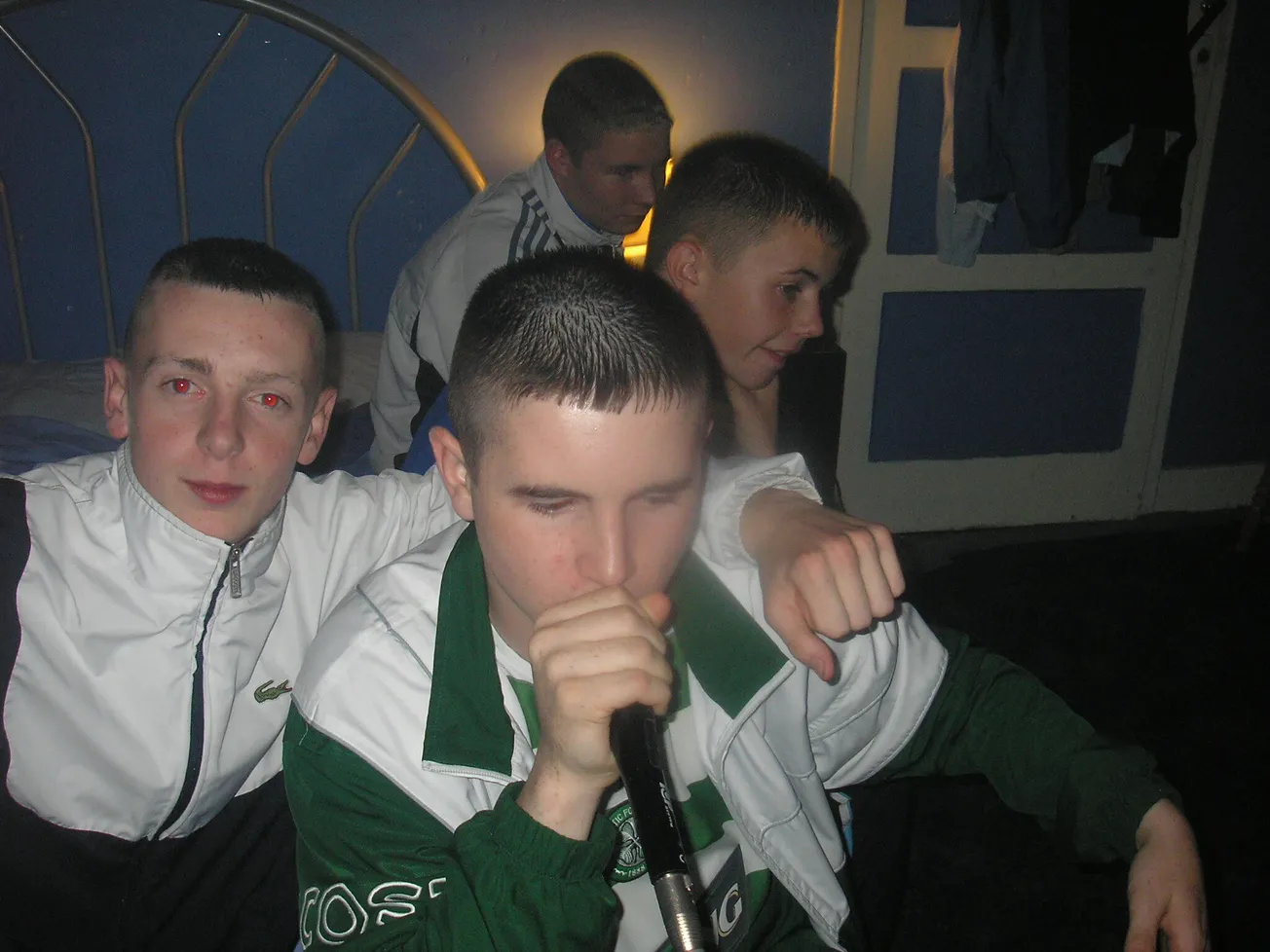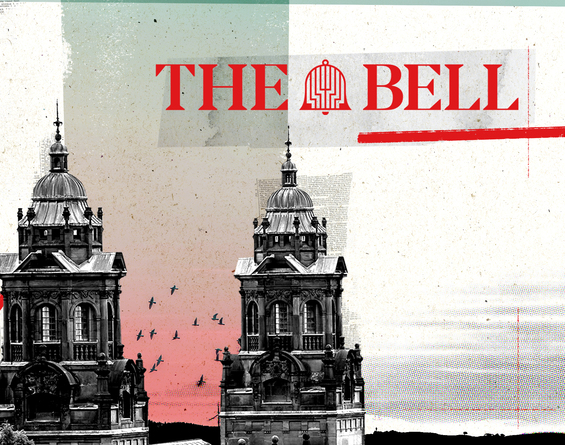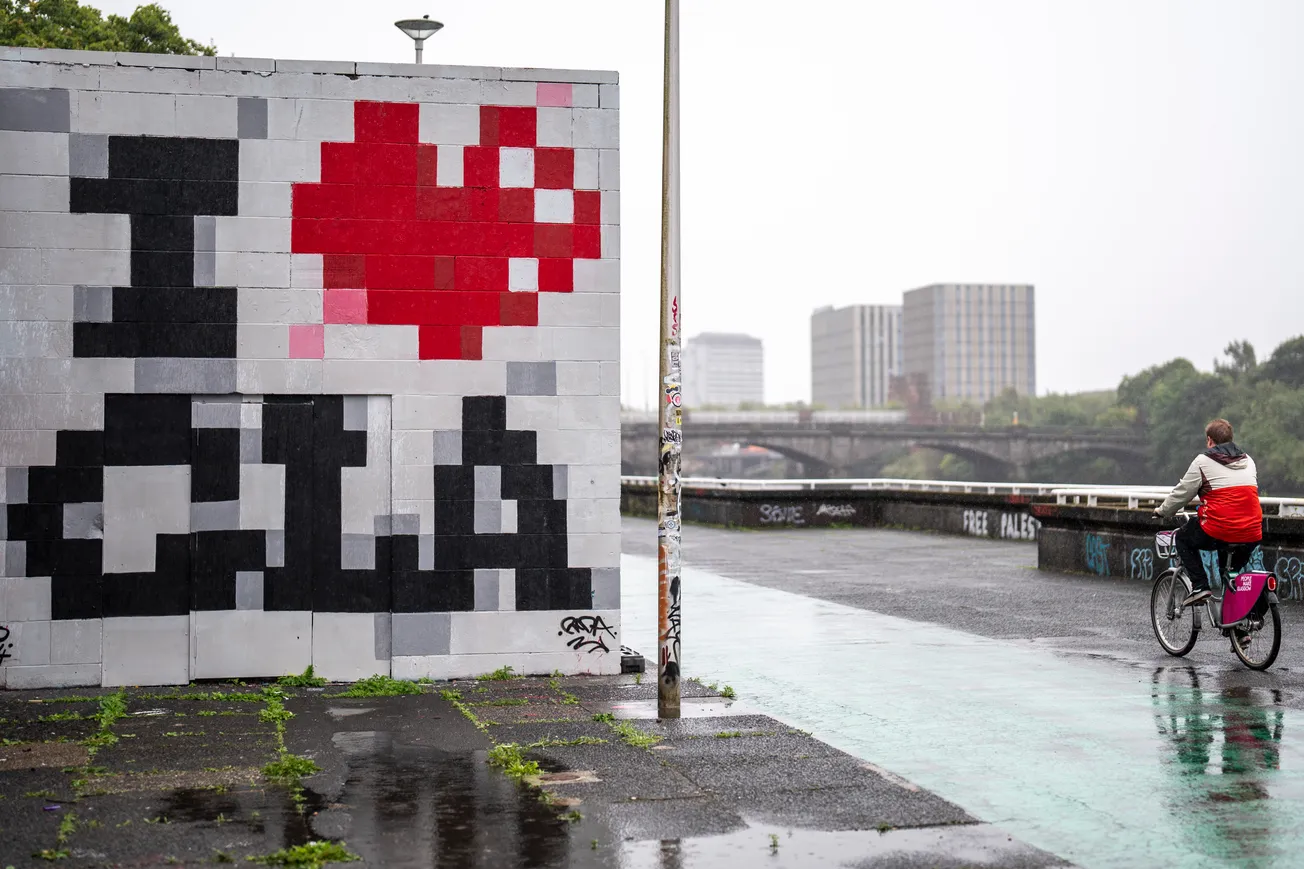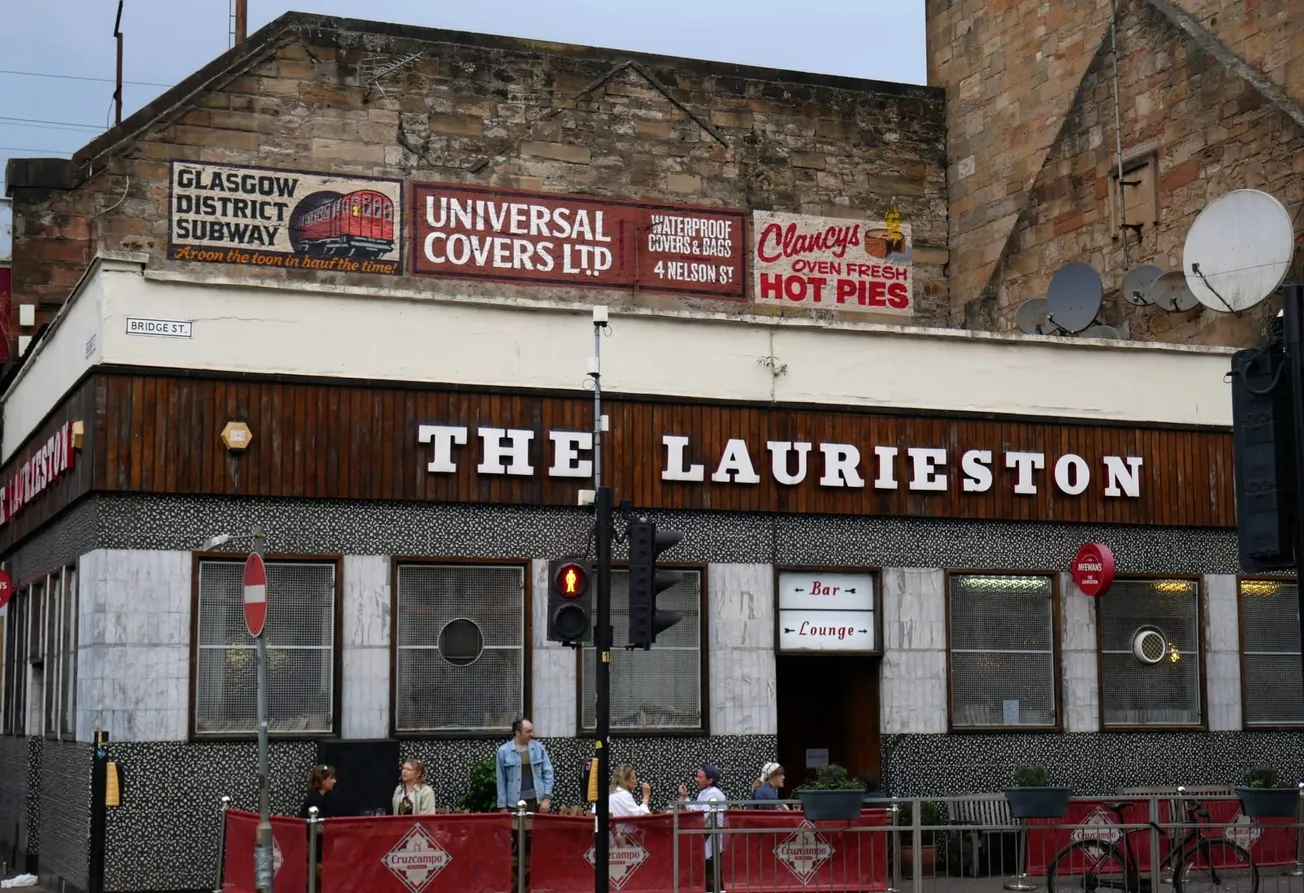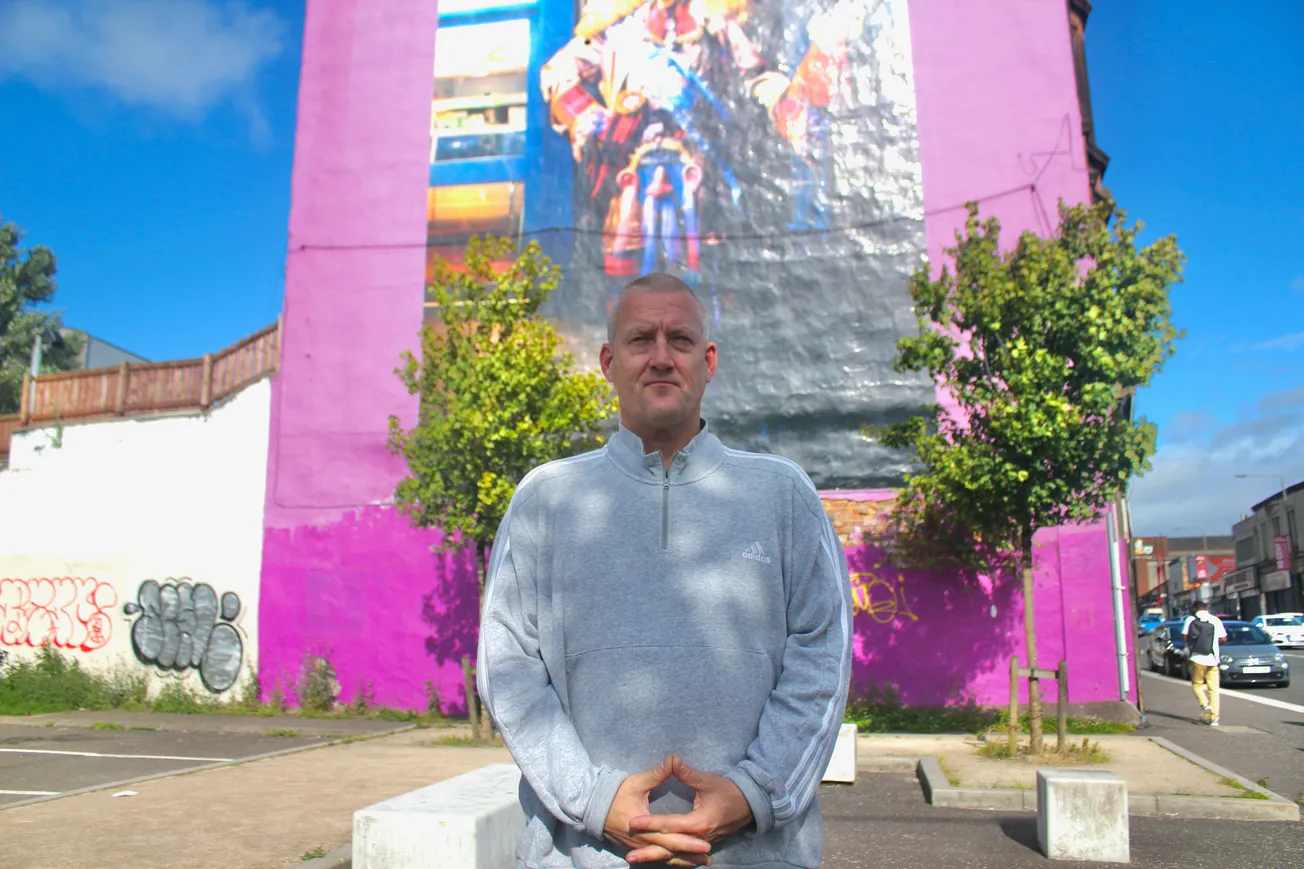Gavin Brewis and I are meeting in a café called Spill the Beans because he reckons the name is appropriate. Over coffee (his order is an unexpected oat milk pumpkin spice latte), he gives me a quick run-through of his life so far: a childhood between schemes, kicked out of two schools for violent behaviour by the age of 14, involvement with young teams, a deferred sentence, seven years in the army, a few more in the fish farms. Nowadays, he’s midway through a PhD on psychosocial trauma within ned culture.
Before Gavin was making headlines for his against-the-odds academic career and unusual thesis matter, he’d already had his 15 minutes for a very different reason. Just after the turn of the millennium, Gavin was making waves among Glasgow ravers as none other than the celebrated and beloved DJ ‘GFB’: Gav Fukin Bee.
Most people who were under the age of 30 and living in Glasgow in the early 2000s will surely remember, fondly or otherwise, the heyday of happy hardcore DJs. But for the uninitiated, happy hardcore is a subgenre of hardcore dance music that originated in the UK, characterised by breakbeats, pounding 4/4 kickdrums, and often pitched-up, sped-up vocals.
Tempos ranged from anywhere between 160 and 190 BPM, creating a theoretically uplifting and cheerful sound (hence the name) that in practice was not so much ‘happy’ as it was ‘headache-inducing’. The ‘Bonkers’ albums – infamous happy hardcore compilations – started coming in 1996 and didn’t stop until 2009. They caused an unprecedented boom in popularity for the genre, particularly across north east England and parts of Scotland. And it was teenagers at the forefront, armed only with computer mice, their external hard drives, and cheap PC mics.
Glasgow was arguably the city that took the spirit of happy hardcore furthest. Soon, PC DJs like Gavin were popping up all over the city and pirate radio stations were battling over the airwaves, fighting for the chance to play the DJ SY remix of ‘Feel It’. “When jungle and grime and all that got big in the north east [of England], Glasgow was still listening to happy hardcore,” says Gavin, who was in his early teens when the genre first emerged. But in comparison to other cities and their subcultures, the history of Glasgow’s love affair with sky-high BPMs seems to have been broadly overlooked. This is despite (or perhaps due to) its integral role in the history of the city’s gang warfare.
“People don’t want to humanise or give credit to a disenfranchised population, or a problematic population,” Gavin offers as an explanation for why what he calls ‘ned culture’ has been historically disregarded. “And there’s a class aspect to it. Goths, mods, rockers, punks — middle-class people could dip their toe in those cultures. It’s a lot more difficult for a middle-class person to dip their toe into ned culture.”
While the UK-wide rave scene has long been respected as a subculture – inspiring countless academic analyses, museum retrospectives, and thinkpieces in the LRB – Gavin explains that the adjacent and equally important ned scene in Glasgow is not. “Ned culture was tapped into rave music,” he says, “but they never adopted rave culture. If you look at the old pictures, they were just going along wearing their Mera Peak jackets, their hats.”
Rather than becoming absorbed into rave culture, ned culture in Glasgow soon broke away to follow its own path, rejecting genres such as house and techno in favour of the faster and altogether more bizarre happy hardcore. Soon clubs such as Archaos on Queen Street were catering to the growing demand for the relatively niche genre. Archaos was the rare club that would play happy hardcore when others wouldn’t, Gavin recalls. From 2000, the venue put on a short-lived and highly notorious ‘unders’ night for 14-18-year-old Glaswegians, who proved to be the perfect audience for the chaos and absurdism of the genre.
Not content to simply listen to happy hardcore, Gavin and his peers soon started making it, and in 2003 the era of the PC DJ began, requiring only access to a computer, and the right software. “Some people used Acid Pro ’cause they had effects,” says Gavin, but he favoured Acoustica, “cause I just got the tunes and made sure they were in beat.” He walks me through the process of creating your own PC DJ Track.
First, you choose a backing track, typically either happy or UK hardcore, or Italo dance. “Then you speed it up a bit and you put an acapella over it,” he says — aka vocals without a backing track, usually sourced from pirate websites such as Soulseek or Limewire. “The people with the rarest acapellas and the rarest tunes, those were the ones you wanted to hear,” he says. “But you could use anything at all as long as it was in beat. It didn’t even have to be in beat.”
Perhaps due to both its simplicity and its limitations, the popularity of PC DJing was short-lived. By 2006, adjacent genres such as ‘Makina’, aka Spanish hardcore, had reached the Glasgow music scene. Interest in the PC DJ dwindled and a new local hero took its place: the MC. Slang developed from ‘master of ceremonies’ via years of hip hop evolution, by the late 2000s, MCs refer to a specific type of rapper, one who commands a particular level of respect. They’re considered all rounders, performers who can switch up wordplay up on the spot. All MCs are rappers but not all rappers are MCs.

Gavin’s MCing career began after he grew bored of the repetitive nature of his music-making process. He started trading well-sourced acapellas for self-penned bars. “I got a wee shitty PC mic,” he says, “and obviously I was quite young, so I was in my granny and granda’s house trying not to do it too loud ’cause I was embarrassed. I was basically just talking into it.”
His lyrics ranged from casual songs about raves, to confessional pieces about the gang fighting in which he was beginning to get involved. When in 2006 he got into trouble with the police and avoided a prison sentence by joining the army, he began to write songs about the dual nature of being a soldier and a self-proclaimed ned. He recites one of them to me over the hiss of the coffee machine at Spill the Beans:
“Trackies and trainers, the hat that’s on my head
People say I’m prejudiced, but they’re calling me a ned
But they don’t even know me cause there’s two sides to this mug
In uniform a hero but in the streets they call me thug.
A hooligan, a thug, that’s all I ever hear
But if there was a war I’d be hero of the year
Serving overseas for a war that’s not our own
But that’s the job I’m in, ’cause I’m hardcore to the bone.”
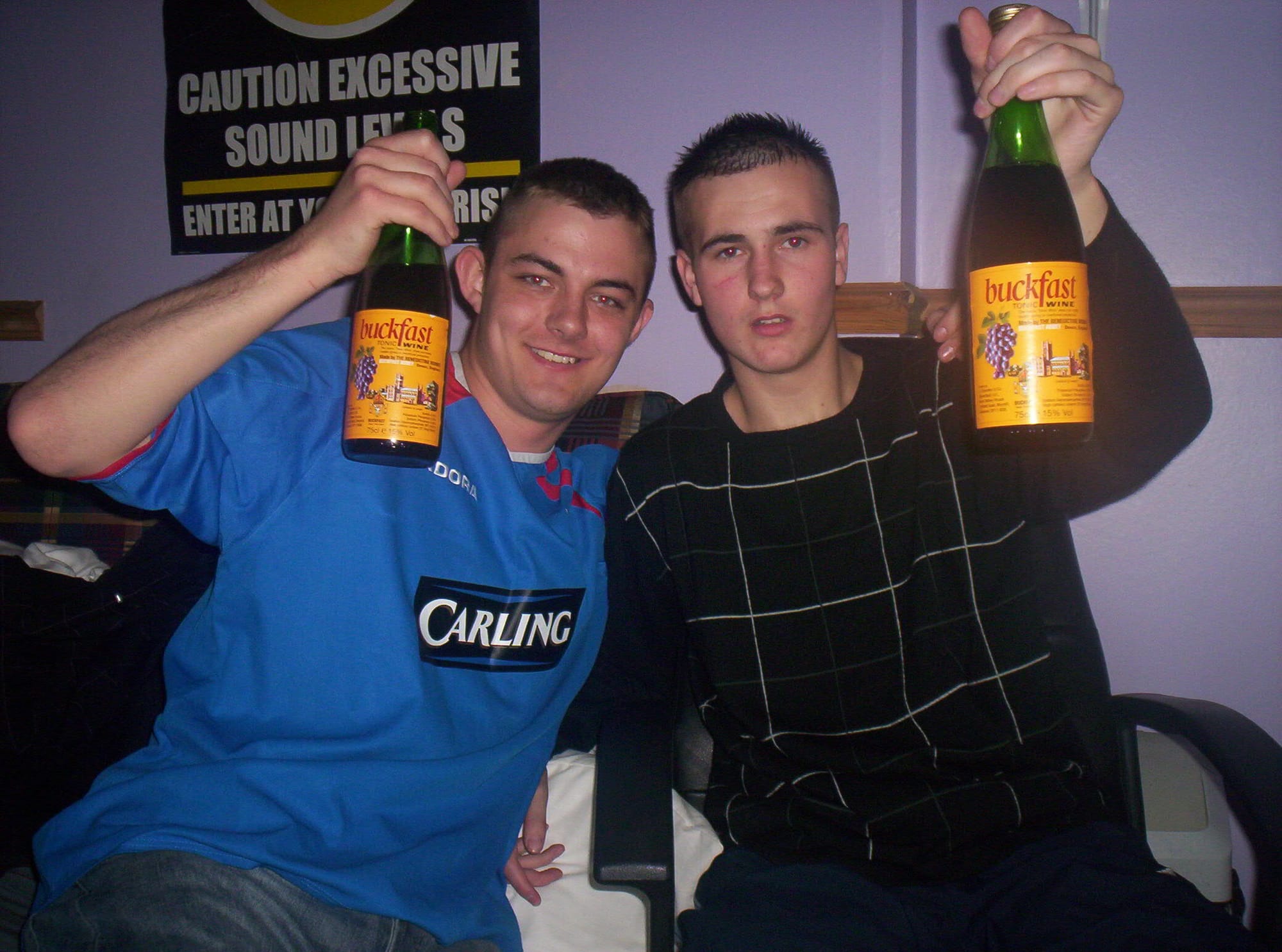
Back at The Bell HQ, I meet up with Thomas ‘Tom’ Gillies, originally from Pollok but currently living in Paisley, where he runs a dog grooming salon with his wife. Tom and Gavin have known each other for decades — but they initially didn’t get on very well due to Tom once hitting Gavin in the shin with a hockey puck in P.E. “He was raging,” Tom tells me, “he was a big guy, I thought he was gonnae do me. But nah, he took it on the shin.”
However, the pair put their differences aside when they delved into the world of PC DJing at around the same time. “We were the Originals, they called us,” Tom explains. He tells me that the first PC DJ in Scotland was DJ Rankin from Falkirk, but not long after his success, young Glaswegians like Tom and Gavin started copying his style. “Me and a few of the other boys clocked on to what he was doing… basically mixing high-pitched acapellas and ripping off other people’s tracks. We were like that – ‘We’ll gie it a bash!’”
If you're reading this and you haven't yet joined our free mailing list, click here to get Glasgow's new quality newspaper in your inbox every week.
Under the moniker DJ Gillies, Tom teamed up with DJ Gav Fuckin Bee to recreate what DJ Rankin was doing — or, according to Gavin, improve on what he was doing, as DJ Rankin didn’t beatmatch. “It was myself, DJ Fatcat, Gavin, maybe six or seven of us,” says Tom. “Anywhere we went we were treated like royalty. So even though gang fighting was rife at the time, we could go anywhere and be respected. Even in other schemes, we’d be getting mad wi it with them and nipping their birds.”
Music as a way to physically get out of their schemes is something that Gavin mentions too. “Back then, you couldn’t really leave your scheme, or you’d probably get stabbed,” he explains. “A lot of people couldnae afford to go on holidays, they couldnae go to the dancing, they pretty much just stuck with one area, or maybe went to a rival scheme to go to the swimming, but that brought its own problems.” However, the respect found as DJs, and the rise of internet messaging sites such as Bebo and Yahoo Messenger, allowed people who would otherwise be fighting and even killing each other on the streets to come together over a shared love of dance music.
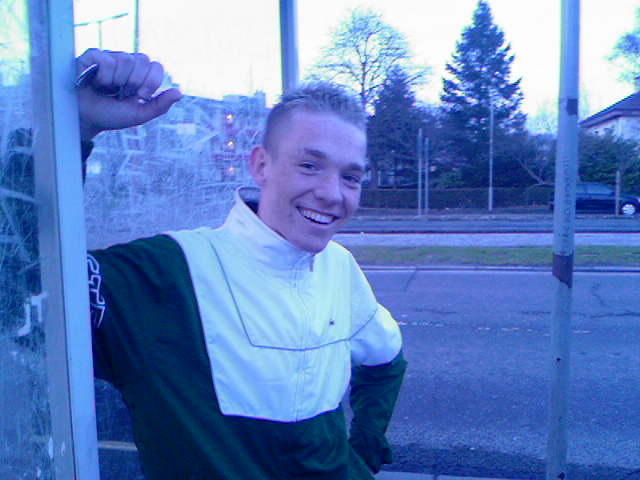
Early social networking sites were often used to arrange fights, but Gavin says they connected people too. “When you went on there you started realising, ‘aw there’s people that are the same as me from a different scheme’,” he says. “You started realising that there’s other music out there, other cultures, dress styles, attitudes, behaviours.”
Yahoo Messenger soon became a site not just for social networking, but for sharing new music they had made. ‘Glasgow Global Chat 1’ was where everyone wanted to be. Each user had an ‘addy’, or address, with their name and their young team (Gavin’s was ‘Gavbmossypossy’) and they would compete across Glasgow Global Chat 1 to “hog the button,” aka fight over the audio button in order to share their tunes with the rest of the chat.
Tensions still arose in the physical world. Tom remembers him and Gavin visiting a few Cumbernauld boys they met on Yahoo Messenger, aged 17. Somehow, the meetup saw the pair and their mates become seriously embroiled in a gang fight. “Me and Gavin ended up right in amongst it,” Tom recounts. “No knives, just lobbing bricks and whatever was lying about that you could pick up.”
In 2006, around the same time Gavin was giving up PC DJing for a mic (and enlisting in the army), Tom was also giving up PC DJing for the underground world of pirate radio. As a teenager, he had grown up listening to pirate radio station Club FM, which started broadcasting in the late 1990s, run by brothers Billy and Stephen Smith (only the latter, for some reason, was nicknamed ‘Smiddy’).
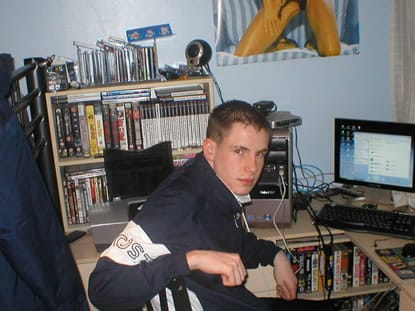
Club FM was a huge influence on Glasgow. The station was known for doing shoutouts; in fact, Gavin insists that they pioneered the practice in Scotland [editor’s note: The Bell has been unable to verify this bold claim]. “They still do shoutouts on Clyde 1 now. You hear George Bowie doing them, but pirate radios were doing it first,” he says.
By Gavin’s telling, Club FM influenced the music that was being played on local radio, including forcing Clyde 1 to start playing dance music on a Saturday night, something he says only began after pirate radio boomed in popularity. “It totally shaped a lot of the culture,” he asserts.
But it wasn’t all roses and radical radio. The station would organise phone-ins, during which members of rival young teams would argue live over the radio, insulting each other and often arranging fights. “It was funny ’cause obviously you had pirate radio stations across the country, but this [phone-in fights] was only done in Glasgow,” Gavin notes. “It was basically extending the gang warfare through the airwaves.”
Tom agrees. “Pirate radio was causing gang fights,” he says, “and Club FM were the worst for it. He had all these gangs phoning up frae all over Glasgow giving it ‘fuck yer Ibrox and fuck yer Pollok and yer maw’s this and that’. Billy used to let them on live and just have at it.”
Pirate radio wasn’t the only aspect of dance music culture that was encouraging fights between gangs. Around 2004, a new trend emerged among the Yahoo Messenger-using, happy hardcore-listening teens of Glasgow: diss tracks. Tom describes them as their own subgenre of hardcore dance music, favoured by the gang members doing most of the fighting. “It was all fuck yer maw and slagging each others’ burds,” he says.
The impact of diss tracks were two-fold. On one hand, Tom considers them to be an interesting and important form of self-expression — gang members expressing their hatred and their anger through a new, creative format. “Now, you could take that and say, ‘well maybe that would deescalate the gang fighting,’” he says. Perhaps, he suggests, if gang members were able to iron out their differences through the medium of song, they wouldn’t need to “go stabbing each other.”
“But nah,” he says. “Didnae work like that. That would be wishful thinking. I think it was adding fuel to the fire.” According to Tom, diss tracks would be released throughout the week, leading to a build-up of anger by the time Friday came around. “YPEN would do one about Hillington,” he says, “and Hillington would retaliate, and by the weekend they were killing each other.” In Glasgow, a moral panic surrounding gang violence was in full swing. After 2010, this began to dissipate, and the young teams with it. As teenage gangs started to disappear, their subcultures inevitably lost momentum.
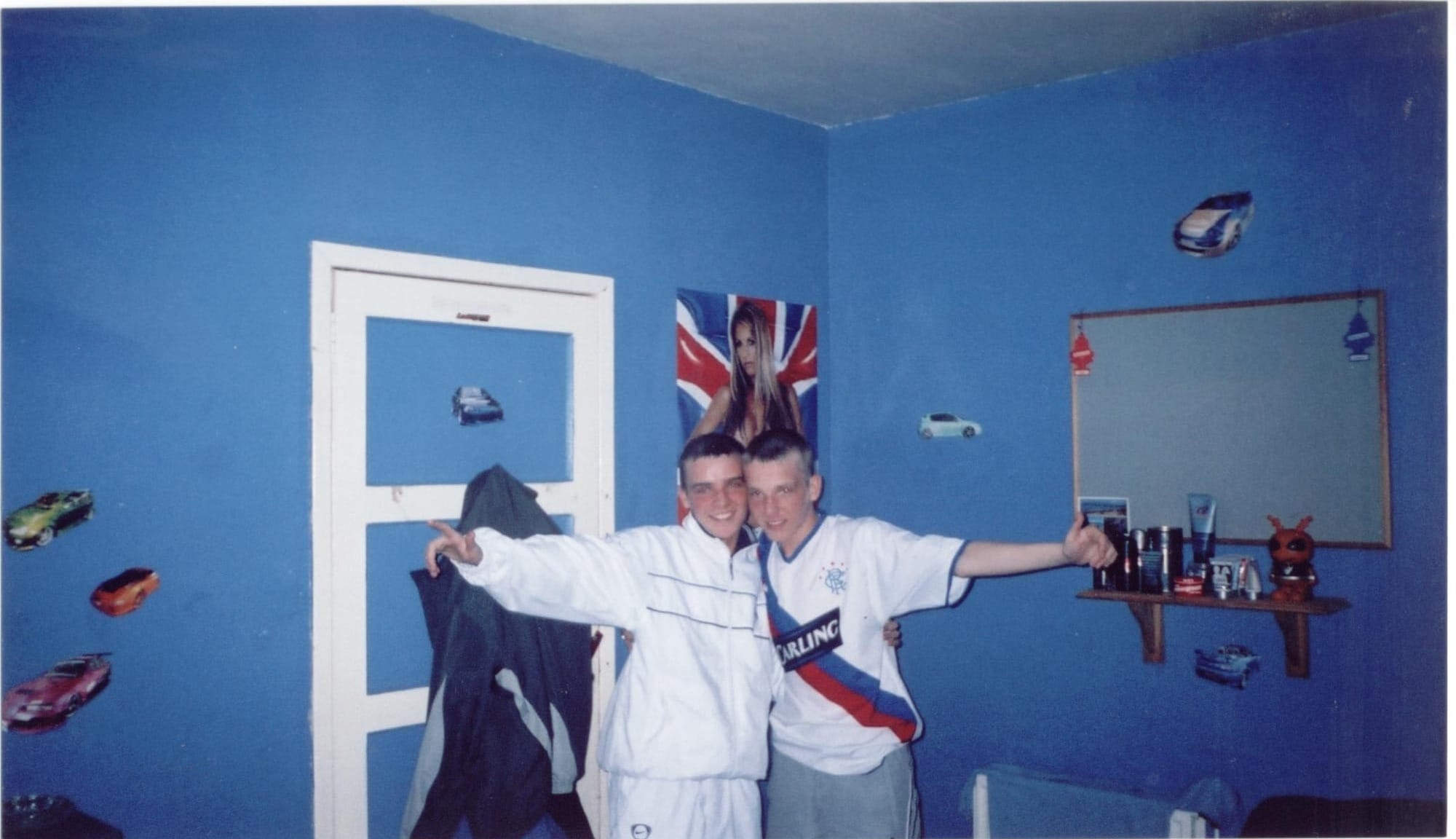
Billy Smith ran Club FM on and off until 2005 but Police Scotland were on his trail, with regular busts. One more would have resulted in a custodial sentence, Tom recalls. To try and save the station, Billy began dabbling with the idea of moving his setup outdoors. “There’s a place called the Valley in Pollok, up the back of the Lidl on Crookston Road,” says Tom. “He was up there with a generator and all that trying to do it in the pishing rain. It just wasnae happening.” The Smith brothers decided it was time to call it a day.
Tom’s older brother knew Billy from school, and eventually word reached Tom that he was giving up the radio and selling his gear. Without thinking much about the practicalities, Tom purchased the lot for £350: decks, transmitter, antenna. “I’m looking at it like that, ‘what the fucks going on here?’” Tom says. “Billy’s telling me how to do it, but it’s in one ear and out the other.” Luckily, Tom’s dad had briefly worked in citizens band radio back in the day. “He went away up the roof and put my aerial up, got me on air the next day and that was that. That was 2006. This is 2024 and I’m still doing it.”
When Tom took over Club FM, he claims to have put an immediate end to the on-air fighting, not least because he was keen on avoiding fines and a stint in the jail. He kept the phone-ins, but there was no arguing, and he tells me that if anyone so much as swore he would take them off air. “I’d let people on live to give shouts, but not to gie it the gang shite,” he says. Tom credits this change with allowing him to get Club FM on the air to this day, currently broadcasting around once a month, without receiving any trouble from the police. “If you’re not abusing it, they’ll leave you alone,” he explains. “I’m not gonna promote gang warfare, they know that. I’m only gonna play a few tunes.”
Gang warfare has calmed since its Noughties heyday, although recently a increases in deprivation plus new technologies have seen crime linked to young teams rise once more. “It’s cyclical,” author and former young team member Graeme Armstrong remarked in 2023. “These things fall and rise, but unfortunately it feels like we’re in an ascendancy at the moment.”
Even if young teams are coming back, happy hardcore, for better or for worse, doesn’t seem to have returned with them, and this despite a mainstream revitalisation of club music – Makina has all but taken over. Still, I ask Tom why he thinks happy hardcore, Makina, and other high-energy dance music genres are consistently so popular in Glasgow. “I don’t know,” he replies. “It almost came with the culture didn’t it? Bouncy tunes up the park on a Friday or Saturday night. Mera Peaks and cider and bucky…”
“I think us in Glasgow, we’re just a city that likes high BPM music for some reason,” he continues. “Maybe it’s because we’re always on the go, always full of energy wanting to fight wi each other. The music sort of accommodated for that.”
This piece was updated on 2 November 2024 to correct Stephen 'Smiddy' Smith's nickname and the spelling of 'Gav Fukin Bee'.
Comments
How to comment:
If you are already a member,
click here to sign in
and leave a comment.
If you aren't a member,
sign up here
to be able to leave a comment.
To add your photo, click here to create a profile on Gravatar.

